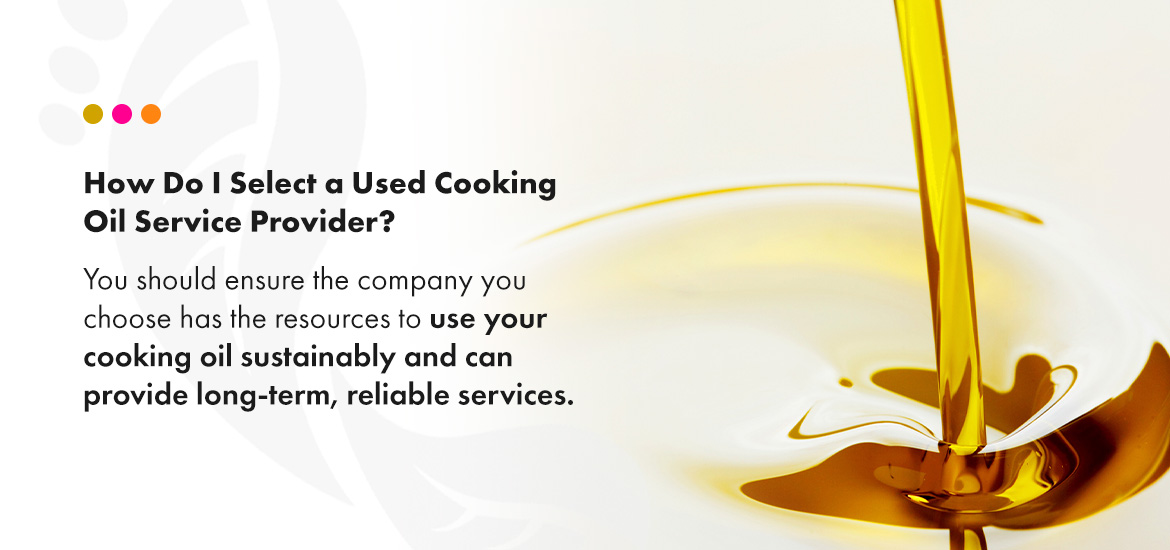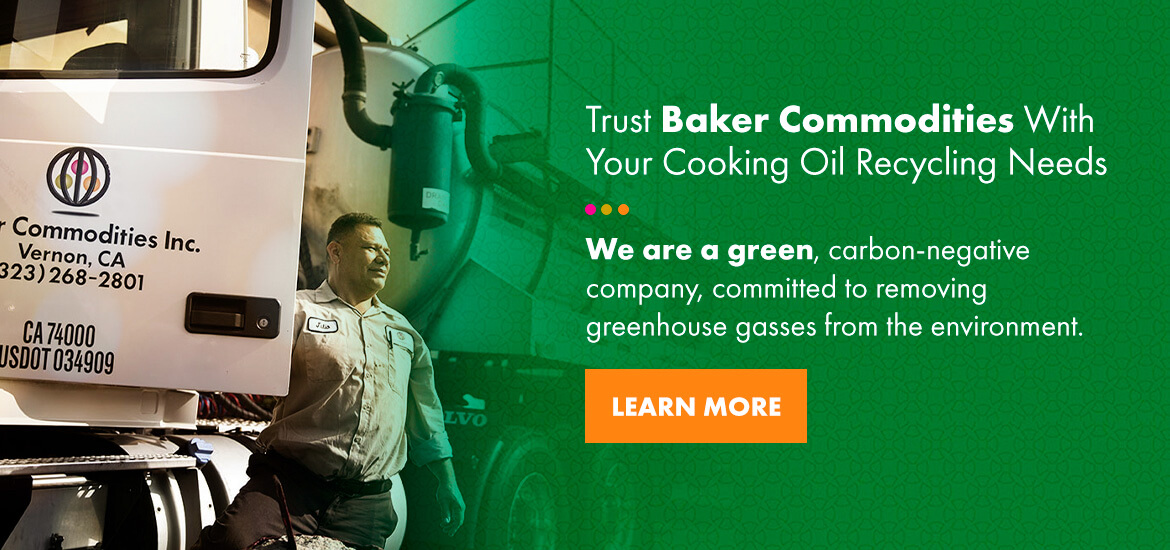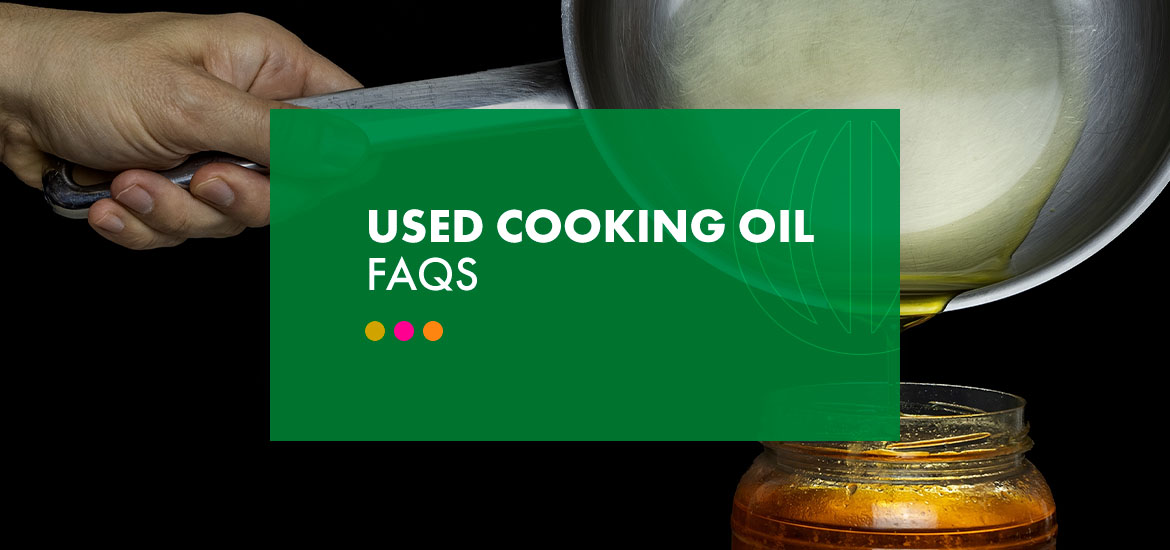Used Cooking Oil FAQs
Understanding what to do with used cooking oil (UCO) helps your company implement more ethical and environmentally friendly practices. When you understand how to properly dispose of UCO and choose a company that recycles it properly, you can rest assured that your used oil fulfills important purposes.
What Is Used Cooking Oil Used For?
Used cooking oil can serve various purposes. Consider the following ways your establishment’s UCO can reach a new purpose and benefit other industries:
- Fuel: Fuel production is the most common use for UCO. A chemical conversion process typically uses recycled cooking oil to produce renewable biodiesel and renewable diesel fuel to power diesel engines while reducing greenhouse gas emissions. Some companies directly use recycled cooking oil as fuel by ultra-filtering it.
- Co-products: The renewable diesel fuel production process delivers co-products such as renewable propane, naphtha and butane. Companies can use these co-products to develop materials such as plastics, solvents, varnish, tires, cleansers and paint thinners.
- Feedstock: Companies can use recycled cooking oil for feedstock to power and lubricate industrial processes and machines.
- Animal feed: The agricultural industry uses recycled cooking oil to add nutrition to animal feed.
- Fertilizer: The agricultural industry also uses recycled cooking oil in fertilizer. Combining UCO with sulfur produces a degradable polymer coating to encase fertilizer pellets.
- Soaps: Industries can use purification and saponification processes to produce soap using used cooking oils.
- Cosmetics: The cosmetics industry uses recycled cooking oil to make products such as hair care solutions, skin care products, lipstick, foundation, eye shadow and concealer. A high oil concentration in these products gives them a soft texture and makes them easy to spread. Additionally, the oil can serve as an alternative to chemical ingredients, making them more environmentally friendly.
How Much Cooking Oil Do Companies Generate in a Year?
The North American Renderers Association (NARA) reports that the rendering industry collects billions of pounds of UCO annually. Food service providers such as grocers, restaurants, casinos and hotels contribute to the country’s total amount of generated UCO. Recycling this large volume of cooking oil is essential because it prevents the oil from causing severe environmental damage.
Can You Recycle All Types of Cooking Oil?
You can recycle any type of UCO, but different rendering companies work with different types. When you choose a UCO service provider, ensure they can work with the type of oil your business uses.
How Do I Select a Used Cooking Oi![]() l Service Provider?
l Service Provider?

A quality cooking oil service provider uses ethical practices you can count on. You should ensure the company you choose has the resources to use your cooking oil sustainably and can provide long-term, reliable services. Before choosing a cooking oil service provider, ask each contender the following questions:
- How can you guarantee my UCO will serve the purposes you claim?
- What does your recycling process look like and which facilities does my UCO end up at?
- How many years of experience does your team have?
- How will you simplify the cooking oil recycling process for my business and employees?
- What is your grease collection schedule?
- Do you lease or own your equipment and fleet?
- How much has your company invested in cooking oil recycling, biofuel production and UCO applications?
- What hours is your customer service team available?
- Can my company contact your service representatives after hours?
- Does your team consistently familiarize themselves with and follow updated local grease trap regulations?
- Are you a carbon-negative company?
- Do you operate your own facility or only transport the UCO elsewhere?
What Do Renderers Do With Used Cooking Oil After Collecting It?
After rendering service technicians collect used cooking oil, they take it to a local processing facility. Rendering professionals ensure UCO reaches companies that can properly recycle it.
How Do Renderers Recycle Used Cooking Oil?
The UCO recycling process happens in the following steps:
- Filtration: UCO moves through strainers to eliminate contaminants such as debris and grill bits.
- Pathogen removal: The recycling preparation process also applies heat to kill pathogens and remove water.
- Marketing: Since used cooking oil is a commodity, renderers market it and track and publish its value daily.
- Shipping: After refining UCO, renderers ship it to various facilities for different purposes such as renewable diesel production.
How Should I Store Used Cooking Oil?
Selecting the right UCO container depends on your kitchen’s space. A service provider can help you determine the right type of container for your business. Since commercial kitchens are often crowded, indoor storage containers must fit into kitchen blueprints seamlessly. Outdoor storage containers are the ideal option for businesses with limited indoor space.
How Can I Tell When My Cooking Oil Expires?
Replacing expired oil is important because fresh oil helps maintain your establishment’s food quality and reduces the frequency you need to filter your fryer. Each time you use cooking oil, it breaks compounds down and becomes less water-resistant. This decreased water resistance allows cooking oil to soak into food. You can tell it’s time to replace your cooking oil when you notice the following indicators:
- Food with a fish-like odor or taste
- Soggy food
- Food with a darker, browner color than usual
- Darker than usual oil
- An unpleasant odor to the oil
- A thick or gummy consistency to the oil
- A soapy appearance to the oil
Why Should I Avoid Depositing Cooking Oil in the Trash or Down the Drain?
You should avoid depositing cooking oil in the trash because it can harm the environment when it sits in a landfill. Food waste is a large contributor to greenhouse gas emissions, which damage the atmosphere and air quality.
It’s important to never discard oil down the drain because it can cause significant plumbing complications and a rancid odor. Oil clogs pipes in kitchens, wastewater treatment centers and public sewer lines. Keeping grease out of the drains prevents sewer overflows, helping maintain water quality. Recycling oil is much safer for the environment and your kitchen pipes.
Improper disposal or illegal dumping of UCO may also carry fines, depending on your state’s and city’s laws.
Do Thieves Really Steal Restaurant Grease?
Reputable companies collect and recycle restaurant grease appropriately, but some people attempt to steal restaurant grease. Since UCO is a commodity, thieves unethically steal restaurant grease to make money. You can prevent restaurant grease theft by storing your grease container indoors, keeping your outdoor container in a locked shed or installing a pipe lock.
Trust Baker Commodities With Your Cooking Oil Recycling Needs
The right company can help you recycle your used cooking oil so it fulfills sustainable purposes. Baker Commodities collects grease and UCO on a schedule that works best for you and your company. We are a green, carbon-negative company, committed to removing greenhouse gasses from the environment. And we do all of this at our own facilities so you know that your UCO is being handled properly by our own manufacturing plants.
We can meet your needs through automatic pumping systems, large container and tank handling, under-counter collection systems and standard barrel and drum services. Contact Baker Commodities to learn more or schedule oil collection services.




